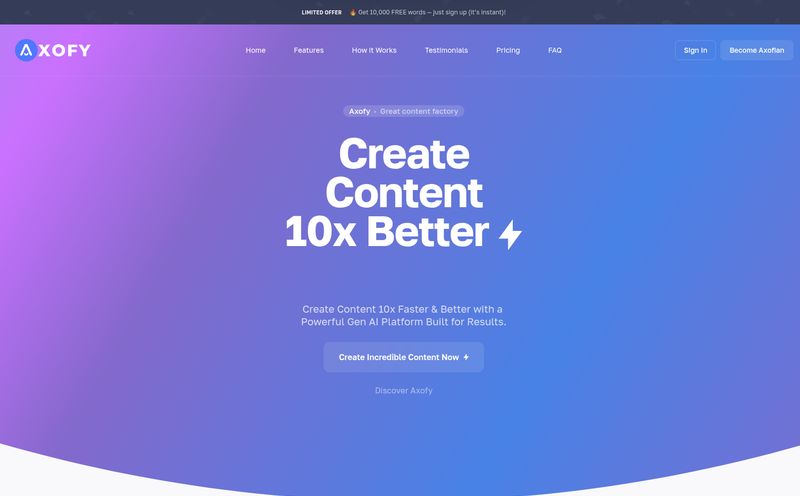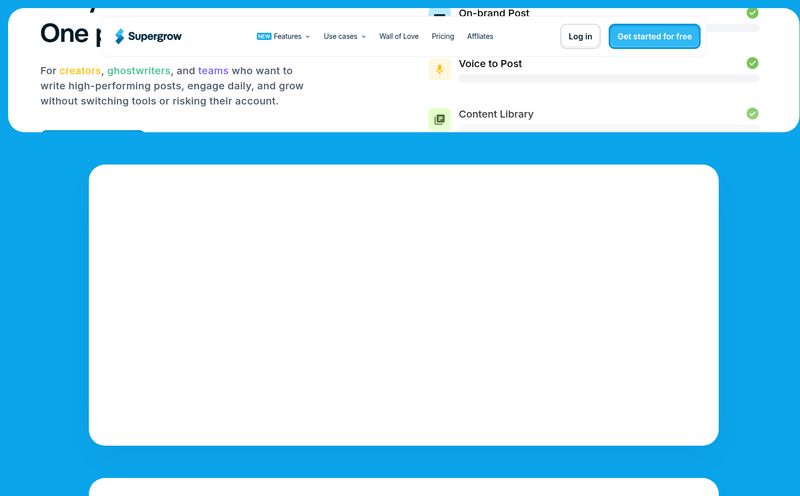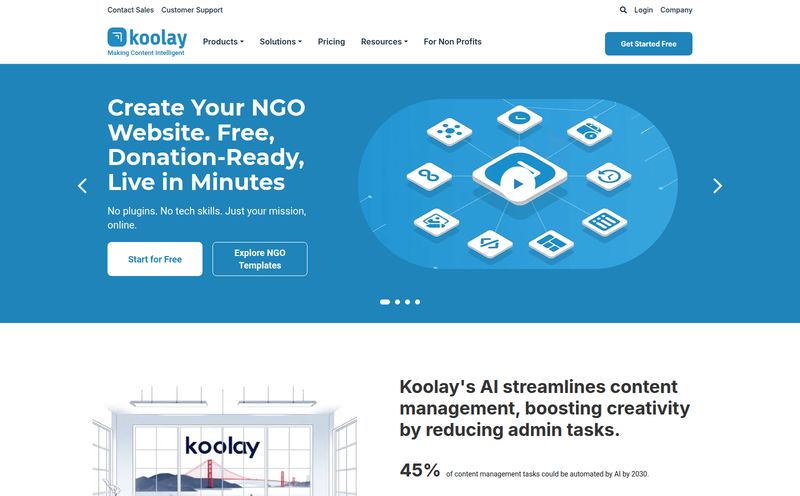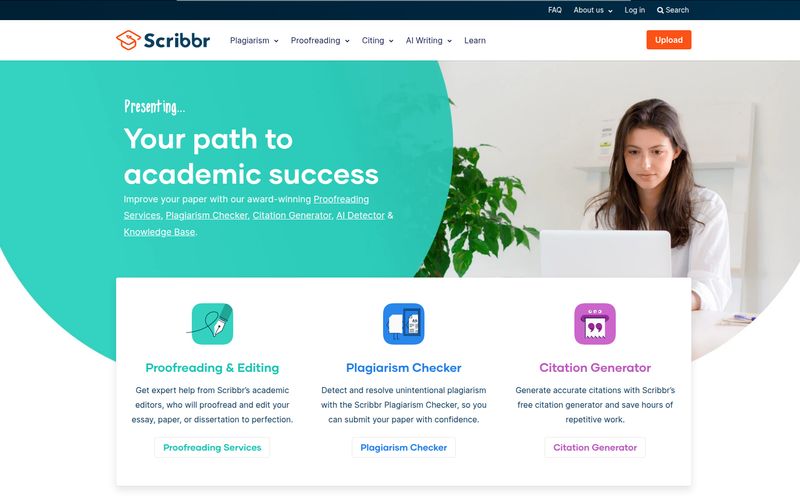How many of you have a 'novel-in-progress' folder gathering digital dust on your hard drive? I know I do. It sits there, next to my 'brilliant blog ideas' and 'get rich quick schemes' folders, mocking me. The dream of writing a book is universal, but the reality? It's a grind. It’s you, a blinking cursor, and the crushing weight of a thousand empty pages.
For years, the process hasn't changed much. Outlining, writing, rewriting, crying, more rewriting... you know the drill. But the tech world is buzzing with a new promise: AI-powered writing assistants. And one name that keeps popping up is Publishing.ai. It claims to be an all-in-one platform to help you create, edit, and publish books faster than ever before.
Faster? Easier? As someone who's spent more hours wrestling with manuscript formatting than I care to admit, my curiosity was definitely piqued. But is it a genuine co-author, or just a fancier version of autocorrect? I decided to take a closer look.

Visit Publishing.ai
So, What Exactly is Publishing.ai?
Think of Publishing.ai less as a robot that writes a book for you, and more like a hyper-caffeinated research assistant, first-draft sprinter, and publishing guru all rolled into one. At its core, it’s a platform designed to streamline the entire book creation process using artificial intelligence. It's not about replacing the author. I think its more about augmenting them. It’s meant to handle the heavy lifting—the initial drafting, the structural editing, the confusing maze of publishing—so you can focus on the core of your story, your ideas, and your unique voice.
The whole idea is to tear down the barriers that stop most people from finishing their books. Time, writer's block, the sheer intimidation of the publishing world... these are the dragons Publishing.ai sets out to slay.
Breaking Down The Core Features
Okay, so it sounds cool in theory. But what does it actually do? The platform seems to be built around a few key pillars.
AI-Powered Book Writing
This is the main event. You provide the ideas, the prompts, the general direction, and the AI gets to work generating text. I imagine this being incredibly useful for smashing through that initial, terrifying first draft. Instead of staring at a blank page, you could give it a chapter outline and have it produce a few thousand words to work with. It's not about getting a perfect, final-product prose. It's about creating the clay you can then mold. For non-fiction, I can see this being a game-changer for drafting chapters based on research notes.
Effortless AI-Assisted Editing
Anyone who has written anything longer than an email knows that writing is rewriting. Publishing.ai includes AI-assisted editing tools that go beyond a simple spell check. We're talking about suggestions for structure, flow, and clarity. It’s like having an editor who can look at your manuscript from a 30,000-foot view and point out where the pacing sags or an argument gets muddled. This could save an incredible amount of time and, frankly, the cost of a developmental editor, which can run into the thousands.
Simplified Book Publishing
And here’s the part that makes my eye twitch just thinking about it: the actual publishing. If you've ever tried to upload a book to Amazon KDP, you know the pain. Margins, bleed, cover specs, ISBNs... it's a nightmare. Publishing.ai promises to simplify this entire workflow. While the specifics aren't super clear from the outside, a tool that formats your manuscript and guides you through teh publishing steps is a massive value proposition on its own. It's the final mile of the marathon, and it’s where so many authors just give up.
The Good, The Bad, and The AI
No tool is perfect, right? Especially one that wades into the very human waters of creative writing. From my perspective as a writer and marketer, here’s how I see the pros and cons shaking out.
| The Upside | The Potential Downsides |
|---|---|
| Speed, speed, speed. The ability to generate a first draft in a fraction of the time is undeniable. This is huge for entrepreneurs, coaches, or anyone wanting to create a lead magnet or establish authority with a book. | Losing your voice. Over-reliance on AI could smooth out the quirky, human edges of your writing. The output will always need a heavy dose of your own personality injected back into it. |
| Breaking down the wall of writer's block. It’s an incredible brainstorming partner that never gets tired or tells you your idea is silly. | The 'Good Enough' Trap. The AI's output quality is entirely dependent on its programming and your prompts. It might be grammatically correct but soulless. It still needs a human eye for nuance and originality. |
| Democratizing publishing. It lowers the technical and financial barriers, allowing more people with great ideas to become authors. | The Editing Imperative. You absolutely cannot just copy, paste, and publish. Every word must be reviewed for accuracy, plagiarism, and coherence. It’s a tool, not a full-on replacement. |
Now, the purists in the room are probably clutching their pearls. And I get it. There's a romance to the lonely, struggling artist. But I also believe that tools are what we make of them. The printing press was once seen as a threat to beautiful, hand-scribed manuscripts. Did it eliminate them? No. But it made knowledge accessible to millions.
"AI is a tool. The choice of how to use it is ours." - Jensen Huang, CEO of NVIDIA
What About The Price Tag?
Here’s the million-dollar question—or, hopefully, a much cheaper one. As of my writing this, Publishing.ai doesn't have a public pricing page. This is pretty common for new platforms in beta or those targeting a more enterprise-level client.
My guess? We're likely looking at a monthly or annual subscription model (SaaS), possibly with different tiers based on word counts or the number of books you can create. There might be a one-time fee option, but subscription is the way of the world these days. I'd hope for a free trial or a limited free plan to let people test the waters before committing. Without a clear price, it's hard to fully judge the value, but if it saves you from hiring a designer, formatter, and developmental editor, it could be a bargain even at a premium price.
Who Is Publishing.ai Actually For?
I don't think this is a tool for the next great literary novelist who cherishes every comma and spends a decade perfecting one manuscript. And that’s okay. I see its sweet spot being for a few key groups:
- The Busy Professional: Consultants, coaches, and entrepreneurs who want to write a book to build authority but don’t have 500 hours to spare.
- The Prolific Non-Fiction Author: Writers who churn out guides, tutorials, and informational books and need to streamline their production process.
- The Content Repurposer: Bloggers and YouTubers sitting on a mountain of content who want to package it into a book.
- The First-Time Author: Anyone who has a great idea but is completely intimidated by the book-writing process and just needs a helping hand to get started.
Frequently Asked Questions about Publishing.ai
- Is using Publishing.ai considered cheating?
- I don't think so. Is using a calculator for math cheating? Or a grammar checker? It's a tool. The ideas, the story, and the final polish are still yours. The ethical line is making sure you are the author, not just the curator of AI text.
- How is this different from just using ChatGPT?
- While both use AI, Publishing.ai is a specialized platform. It’s designed specifically for the long-form book process, incorporating editing and publishing workflows that a general chatbot doesn't have. It’s the difference between a set of general tools and a dedicated workshop.
- Can I really write a whole book with it?
- It seems you can generate a complete first draft, yes. But you will still need to do significant work. Think of it as creating a very detailed, very rough sculpture that you then need to refine and polish into a finished work of art.
- What about copyright and plagiarism?
- This is the big, evolving question in AI right now. Reputable AI tools are trained to produce original content, but the onus is always on the author to check for originality using plagiarism tools. The copyright for works created with significant AI assistance is still a gray area legally, and you should check the latest from the U.S. Copyright Office for guidance.
- Will the final book sound like a robot wrote it?
- Only if you let it. The raw output might lack a human touch. Your job as the author is to rewrite, inject your personality, add anecdotes, and ensure the voice is authentically yours. It provides the skeleton; you provide the soul.
My Final Thoughts on This AI Writing Partner
So, is Publishing.ai the future of writing? Maybe not for everyone, but for a huge number of aspiring authors, I think it could be a powerful ally. It’s not an “author button” you can press to spit out a bestseller. The human element—the creativity, the emotion, the unique perspective—is still, and will always be, the most important ingredient.
But as a tool to vanquish the blank page, to organize your thoughts, and to navigate the treacherous waters of self-publishing? It's an exciting prospect. It has the potential to turn that dusty 'novel-in-progress' folder into a finished book you can actually be proud of. And for many of us, that’s a future worth looking into.
Reference and Sources
- Publishing.ai Official Website
- U.S. Copyright Office - Copyright and Artificial Intelligence
- Amazon Kindle Direct Publishing



